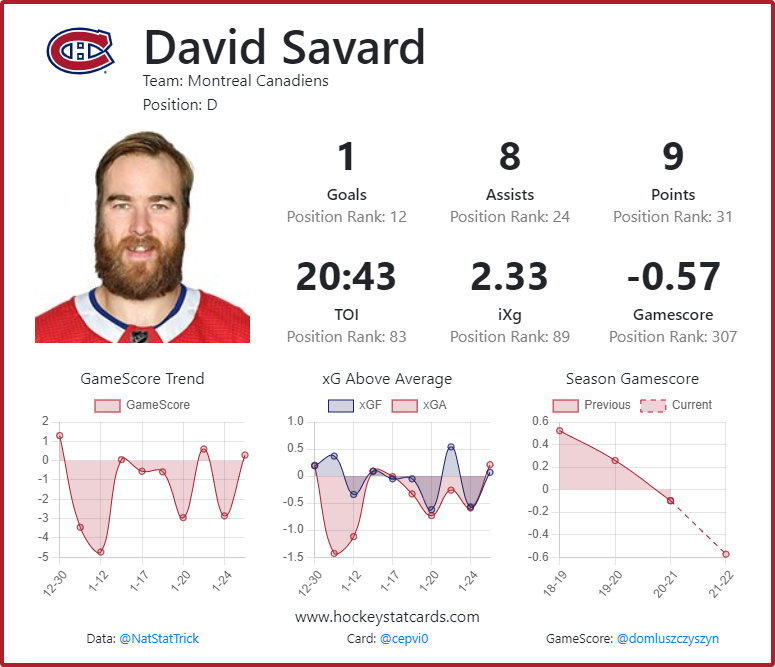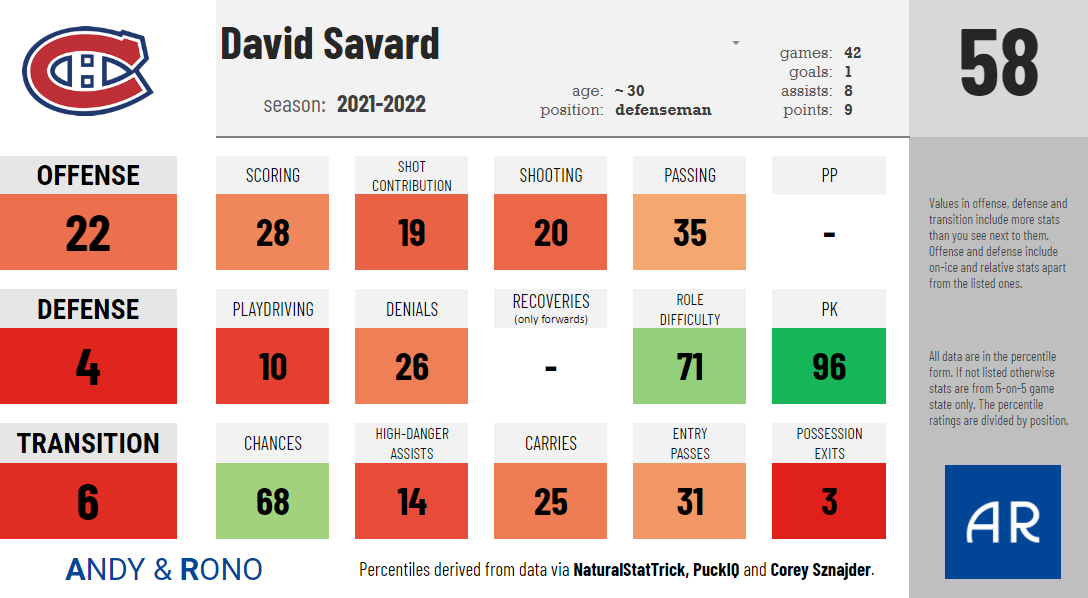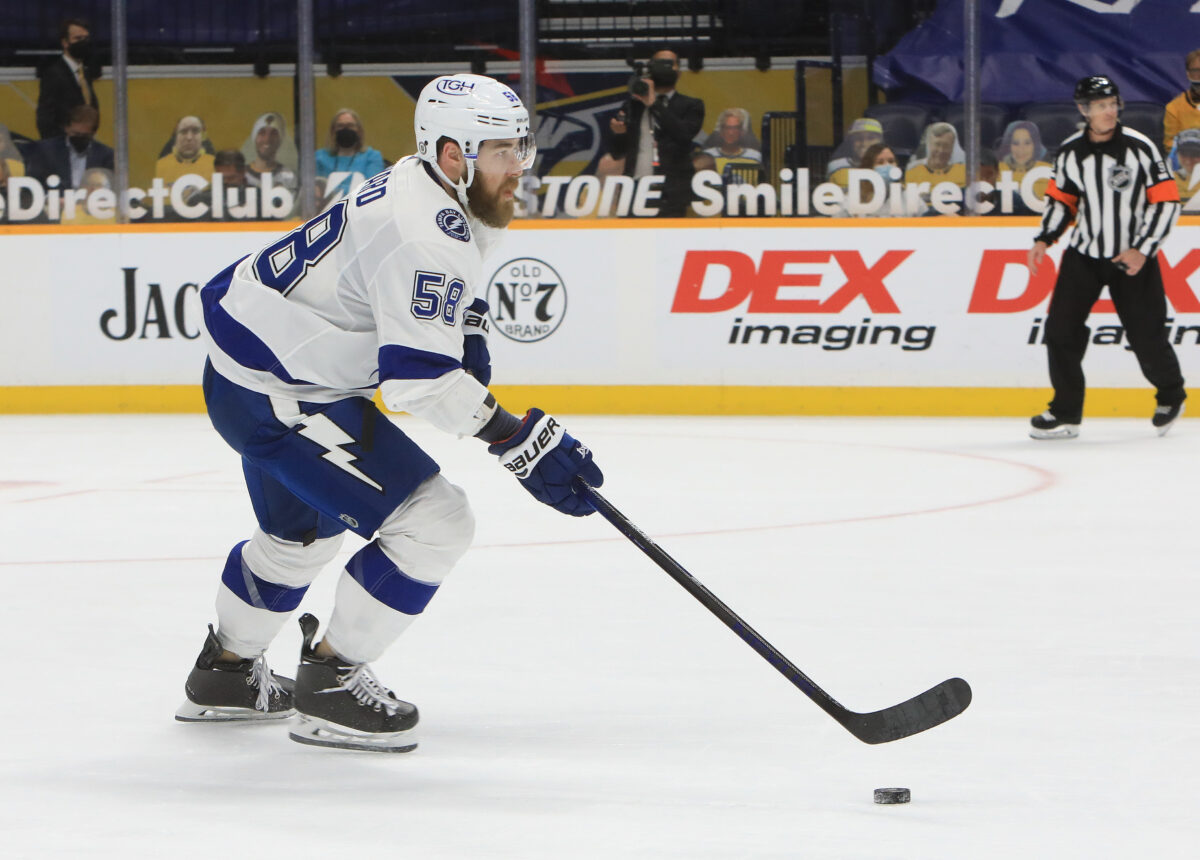After their magical playoff run last season, the Montreal Canadiens looked like a different team when training camp rolled around last September. Carey Price wasn’t playing for the foreseeable future. Shea Weber was on long-term injured reserve and likely retiring. The organization even lost an offer sheet war, with Jesperi Kotkaniemi signing a one-year, $6.1 million contract with the Carolina Hurricanes. Montreal could not have scripted a worse offseason for itself if it tried.
Former Canadiens general manager Marc Bergevin needed replacements and needed them fast, but with the shortened offseason, he had little time to make that happen. In a quest to add depth and shore up their defense, Bergevin inked David Savard to a four-year deal with an average annual value (AAV) of $3.5 million in July. On the surface, a seemingly reasonable contract. Montreal was getting a reliable stay-at-home defenseman with valuable postseason experience. Not to mention, Savard had helped the Tampa Bay Lightning beat the Canadiens in five games in the Stanley Cup Final.
The situation has changed drastically since then. The general manager who signed Savard is no longer with the team, and there’s a strong chance the Canadiens will be going through a full rebuild with Kent Hughes at the helm. It begs the question whether there’s room for Savard through these tumultuous times ahead. Here are some of the reasons why it might be in the team’s best interest to cut their losses and buy out Savard’s contract.
Savard’s Just Not Good
There was a time Savard was a steady player with upside, particularly in the defensive zone. He was a heavy hitter, positionally sound, and a defenseman goalies counted on to keep the puck out of high danger scoring areas. However, his days with the Columbus Blue Jackets are but a speck in the rearview mirror. The 31-year-old defenseman’s impact has rapidly fallen over the last three years, and this season has only emphasized that.

According to Dom Luszczyszyn’s Game Score (shown above) — a score used to measure a player’s overall impact at both ends of the ice — Savard has gone from playing at an effective level in the 2018-19 season to well below a replaceable level this season. In other words, his impact is equivalent to that of a minor-league hockey player or a seventh or eighth NHL defenseman, and this storyline is consistent across many analytics sources. He’s slow, struggles in transition, and has next to no offensive upside. Barring a handful of decent games, the seasoned defenseman has hurt his team more than helped it.
Related: Montreal Canadiens’ Mid-Season Highs & Lows from Disappointing 2021-22
While it’s fair to suggest Savard’s struggles stem from the Canadiens being historically bad this season, his impact has been that much worse than the rest of the team. He was trending down before Bergevin signed him, and that has only continued over the past few months. The analytics help depict his downfall, but a casual fan need only watch Savard for a game or two to know he can’t keep up with the speed of the modern game today.

This stretch in Savard’s career could be anomaly. It’s entirely possible the 31-year-old is going through a rough patch and has a sudden resurgence in the back nine of his career. But with Savard turning 32 years old in October, it’s more likely his best days are behind him. A youth movement is on the horizon and freeing up Savard’s spot would give Montreal crucial roster flexibility for its defense prospects.
Savard Doesn’t Fit in Canadiens’ Rebuild
Newly appointed general manager Hughes has not tipped his hand on how he will restructure his team. However, he has been transparent about his strategy.
In his introductory press conference, the 52-year-old GM mentioned taking a modern approach to building a team — one that prioritizes offense and speed. Hughes also highlighted the importance of analytics and how he plans to use it to evaluate and develop players. Savard doesn’t quite fit that mold. He’s not offensive-minded, nor does he stand out analytically. The 31-year-old’s strengths have always been on the defensive side of the ice, but even that part of his game is no longer strong.

The Canadiens have a wave of young players and prospects at the defense position in the system, including Alexander Romanov, Kale Clague, Kaiden Guhle, Jordan Harris, Mattias Norlinder, among others. Opening up Savard’s spot for one of these players would give Montreal roster flexibility to not only develop their young talent, but assess which prospects are ready to compete at the NHL level.
Savard continuing to take up a roster spot makes little sense. It’s highly unlikely he will be a part of the Canadiens’ long-term future. He is already playing at a replaceable level, eating up cap space, and, perhaps most importantly, taking valuable ice time away from the team’s developing prospects. Hughes can explore the trade market for Savard, but if there is no appetite for the 31-year-old’s contract, buying him out or burying him in the minors is the next logical step.
